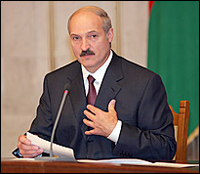Opponents of Alexander Lukashenko face test of strength as they call new protest against election
Opponents of President Alexander Lukashenko faced a crucial test of strength Monday, planning a second protest against a weekend vote the government said had handed the authoritarian incumbent a new five-year term by a massive margin. The EU said the voting had been marred by intimidation.

Central Election Commission chief Lidiya Yermoshina said Lukashenko, who has ruled with an iron fist since 1994, won a "commanding victory" with 82.6 percent, according to a complete preliminary ballot count. Main opposition candidate Alexander Milinkevich received 6 percent, she said.
Addressing a crowd of thousands waving flags and shouting for freedom in a central Minsk square after polls closed Sunday, Milinkevich dismissed the vote as a farce and called for "new, honest elections" in the former Soviet republic.
Austrian Foreign Minister Ursula Plassnik, whose country holds the EU's rotating presidency, said Monday that the opposition "was systematically intimidated" in campaigning for the presidential vote.
Several thousand people massed in Oktyabrskaya Square , heeding Milinkevich's calls for a peaceful protest and defying a government ban on election day rallies that had raised fears of a potentially violent confrontation.
Milinkevich and the other opposition candidate, Alexander Kozulin, called on supporters to return to the square Monday evening signaling a bid to hold a sustained protest like those that brought opposition leaders to power in other ex-Soviet republics, including neighboring Ukraine .
The authorities made no move to disperse protesters Sunday, but busloads of riot police idling on a nearby street were a reminder of the government's threats of a decisive response.
The crowd was the biggest the opposition had mustered in years, reaching at least 10,000, according to AP reporters' estimates. After about three hours, a smaller group marched to nearby Victory Square , some laying carnations at a monument there before dispersing around midnight .
"Tomorrow we will show the world our might!" said Kozulin, who the elections chief said received 2.3 percent of the vote. He demanded the release of what he said were hundreds of opposition activists detained during a campaign marred by heavy-handed government harassment.
At Oktyabrskaya Square , demonstrators waved a national flag that Lukashenko scrapped in favor of a Soviet-style replacement, as well as European Union flags. They shouted "Freedom!" and "Long Live Belarus!"
People blew horns and chanted "Mi-lin-ke-vich!" echoing the much larger crowds on Kiev 's Independence Square in Ukraine 's 2004 Orange Revolution, which brought an opposition leader to power and turned the nation Westward. Lukashenko's Belarus is a close ally of Russia , and the government maintains a tight grip reminiscent of the Soviet era.
Lukashenko has vowed to prevent mass rallies like those in Ukraine , Georgia and Kyrgyzstan in recent years. The use or threat of force neutralized opposition efforts to protest vote results in Azerbaijan and Kazakhstan last year, and a bloody government crackdown in Uzbekistan left hundreds dead.
Western countries have branded Lukashenko Europe's last dictator, and have sharply denounced the conduct of the campaign. An election monitoring team from the Organization for Security and Cooperation in Europe was to release its preliminary assessment of the vote Monday.
OSCE assessments finding elections in Georgia , Ukraine and Kyrgyzstan seriously flawed were key factors in galvanizing the protests in those countries. Belarusian officials have criticized the OSCE as biased, part of a massive campaign accusing Western forces of meddling in its affairs and seeking to topple Lukashenko.
In a report likely to conflict with the OSCE's, the Russian head of the observer mission of a Moscow-dominated grouping of ex-Soviet republics called the election "free, open and transparent" and said it took place "against a backdrop of unprecedented external pressure."
Clearly referring to Western criticism of the campaign, Commonwealth of Independent States mission leader Vladimir Rushailo suggested "prejudiced statements, harsh announcements" and warnings of potential sanctions were aimed at affecting the outcome.
The mission included observers from Russia and seven CIS states that have warm ties with Moscow but none from Georgia , Ukraine or Moldova , which have sought to shed Russian influence and turn Westward.
While Russia 's relations with Belarus are sometimes strained, the Kremlin is wary of losing its only ally between its western border and NATO countries, and has signaled approval of a Lukashenko victory.
Lukashenko dismissed international criticism. "We in Belarus are conducting the election for ourselves," he said. "As for sweeping accusations, I've been hearing them for 10 years. I've already gotten used to them."
A dictator to his critics, many Belarusians see the 51-year-old former collective farm manager as having brought stability after the uncertainty that followed the 1991 Soviet collapse.
Even independent opinion polls suggested Lukashenko, who has pushed through a referendum scrapping term limits and hinted he plans to stay in office indefinitely, would win a majority and avoid a runoff, reports the AP.
D.M.
Subscribe to Pravda.Ru Telegram channel, Facebook, RSS!


